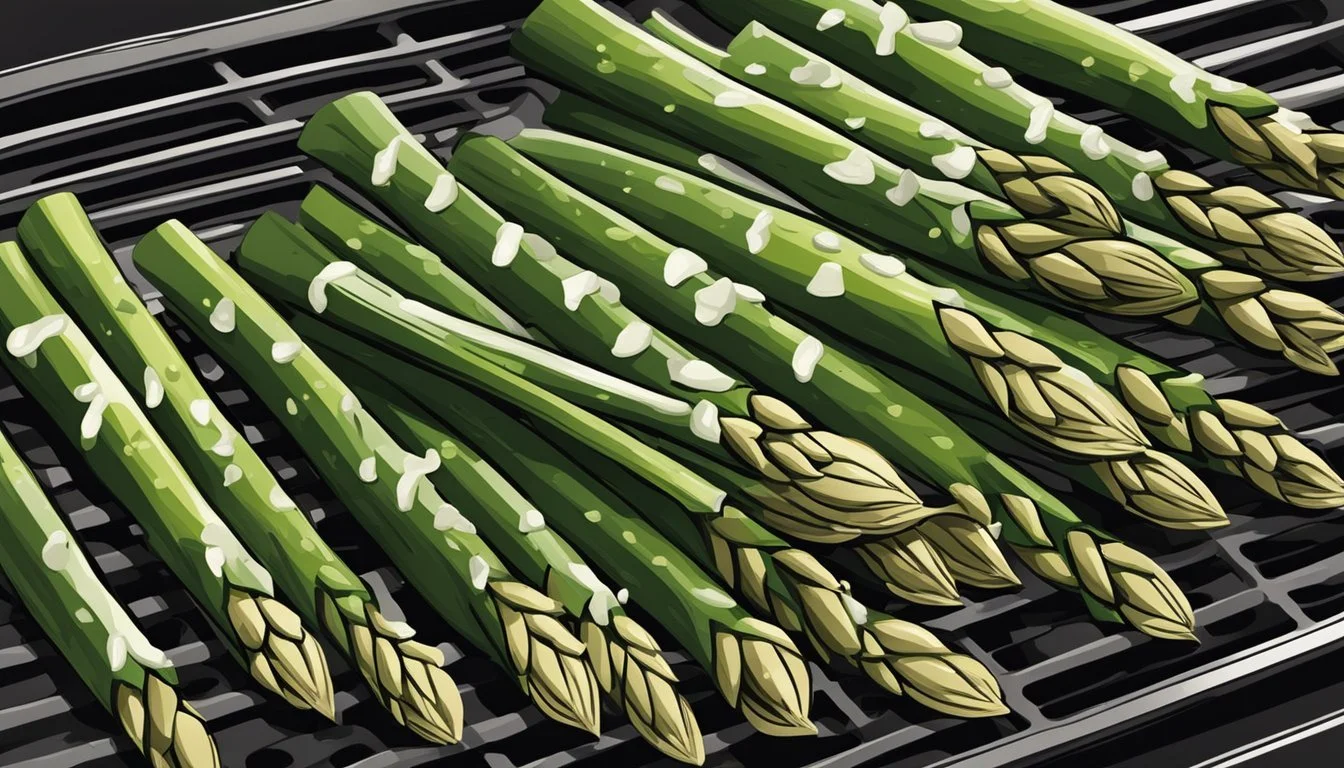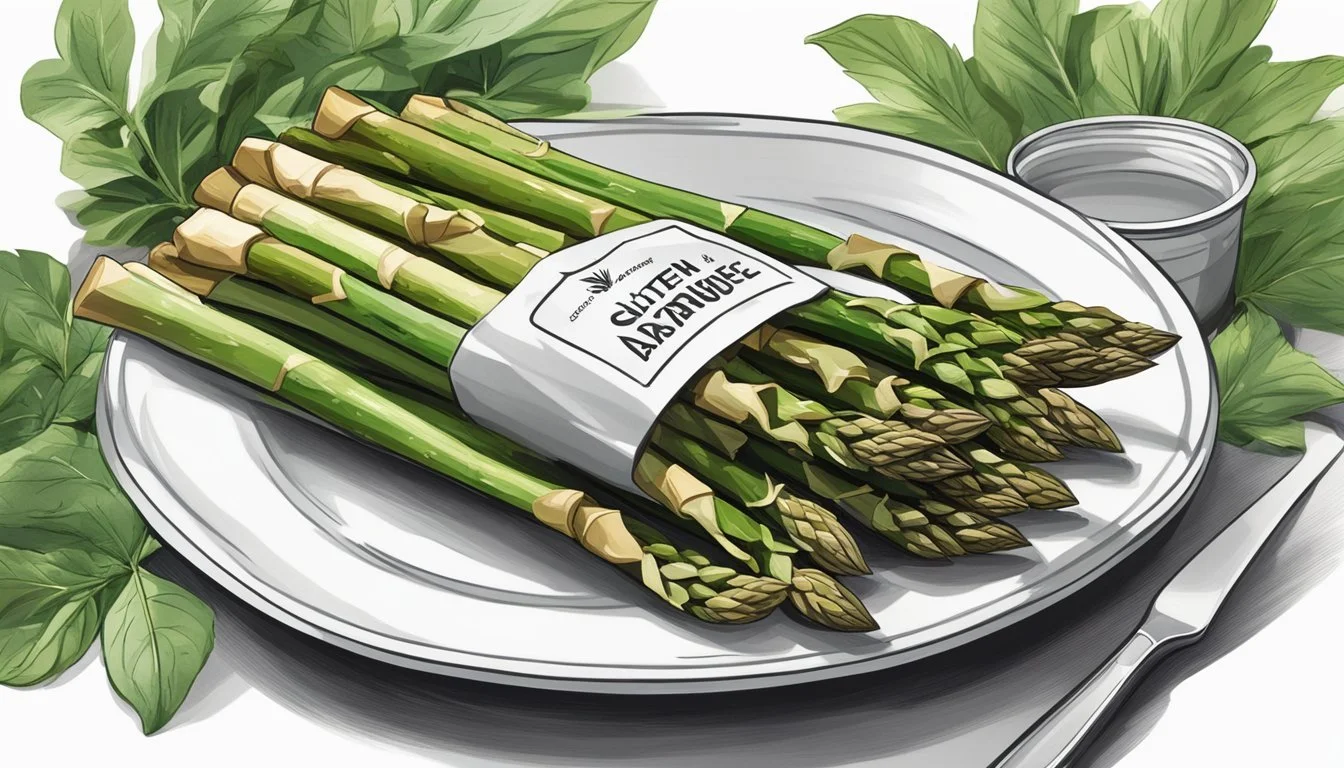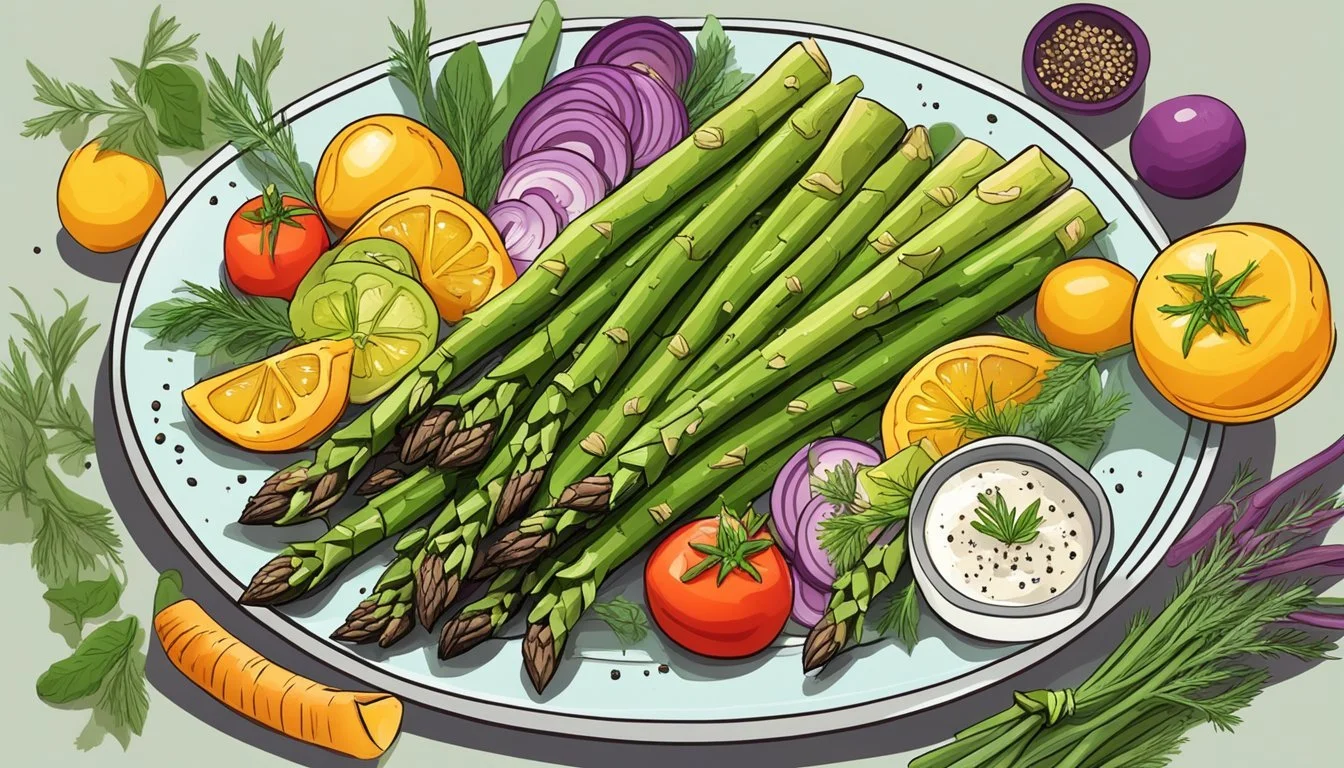How Long Does Gluten-Free Grilled Asparagus Last?
Storage Tips and Shelf Life Explained
Grilled asparagus is a delicious, versatile vegetable that suits many diets, including gluten-free. Storing it properly ensures it remains fresh and appetizing for as long as possible. Gluten-free grilled asparagus typically lasts about 3 to 5 days when stored in the refrigerator.
To maximize its shelf life, keep grilled asparagus in an airtight container. If you plan on using it beyond this period, freezing is an excellent option. Ensure the asparagus is well wrapped and stored in freezer bags to maintain quality for up to six months.
Whether you’re preparing quick weeknight meals or planning for future lunches, knowing how long gluten-free grilled asparagus will keep makes meal planning easier. Proper storage helps retain flavor and texture, offering nutritious and convenient options whenever you need them.
Understanding Gluten-Free Grilling
Gluten-free grilling requires careful consideration to avoid cross-contact and maintain the integrity of gluten-free foods. This section will discuss the importance of a gluten-free diet and techniques to safely grill gluten-free dishes.
Importance of Gluten-Free Diets
A gluten-free diet is essential for individuals with celiac disease or gluten sensitivity. Consuming even small amounts of gluten can trigger adverse reactions in these individuals, including digestive issues and nutrient malabsorption.
Ensuring that grilled foods are free from gluten contamination involves careful selection of ingredients and rigorous grilling practices. Maintaining dietary restrictions while enjoying grilled foods can be challenging, but adhering to these guidelines supports overall health and well-being.
Gluten-Free Grilling Techniques
Effective gluten-free grilling starts with a clean grill. Remove all residue from previous cooking sessions. Designate separate grilling zones: Use the top rack for gluten-free foods, and place gluten-containing items on the lower rack to avoid cross-contact.
Employ aluminum foil or grill pans to create a barrier between gluten-free foods and grilling surfaces. Olive oil is an excellent gluten-free option for brushing vegetables like asparagus. This adds flavor and prevents sticking.
Follow strict utensil protocols. Utilize separate tongs, spatulas, and brushes for gluten-free items. Washing hands and utensils thoroughly between handling different foods is crucial. Adopting these techniques ensures that gluten-free grilled foods are safe and enjoyable for those with dietary restrictions.
Selecting Quality Ingredients
Ensuring the quality of ingredients is paramount for a delicious gluten-free grilled asparagus dish. Focus on choosing fresh, thick asparagus spears and using high-quality oils and seasonings.
Choosing the Best Asparagus Spears
Select asparagus spears that are at least 1/2 inch thick at the base. Thicker spears hold up better on the grill and caramelize beautifully without becoming mushy. Look for bright green stalks that are firm and crisp, with tightly closed tips. Avoid spears that are slimy, wrinkled, or have a strong odor.
Fresh asparagus should snap easily when bent. If possible, buy locally grown or organic asparagus for the best taste and nutritional value.
Selecting Oils and Seasonings
For grilling, olive oil is a popular choice due to its rich flavor and health benefits. Use extra virgin olive oil for a robust taste. Season generously with kosher salt and freshly ground black pepper to enhance the asparagus's natural flavors.
Consider also adding a squeeze of lemon juice after grilling for a fresh, tangy finish. Additional seasoning options include garlic powder, crushed red pepper flakes, or a sprinkle of grated Parmesan cheese for added complexity. Experiment to find your preferred flavor profile.
Preparation of Grilled Asparagus
Grilled asparagus begins with proper preparation, including cleaning and trimming, followed by a well-balanced seasoning or marinade. Each step enhances flavor and ensures even cooking.
Prepping Asparagus for Grilling
Start by selecting fresh, green asparagus. Rinse the stalks under cool water to remove any soil. Pat them dry with a clean towel. Snap off the woody ends by bending each stalk until it breaks naturally, or trim them using a sharp knife.
Lay the asparagus out on a flat surface. Ensure the stalks are uniform in size for even grilling. Smaller stalks tend to cook faster, while thicker ones may need more time.
Mixing Marinades and Spices
In a large bowl, combine asparagus with 2-3 tablespoons of olive oil. Toss until well-coated. Add a pinch of salt and freshly ground pepper to taste. For extra flavor, include minced garlic, zest from 1 lemon, and a splash of vinegar.
For those looking for diverse flavors, add in a teaspoon of chili flakes or a sprinkle of grated Parmesan. Mix thoroughly to ensure each stalk is evenly seasoned before placing on the grill.
Cooking Methodology
Grilling asparagus involves specific techniques and careful heat management to achieve a delicious, charred outcome. Following proper grilling tips and managing timing and heat are essential for perfectly grilled asparagus.
Grilling Techniques and Tips
Trim the woody ends of the asparagus stalks before grilling. Lightly coat asparagus spears with olive oil for an even grill. Season with salt and pepper to enhance flavor. Place asparagus perpendicular to the grill grates to prevent them from falling through.
For a grill pan, arrange the asparagus evenly. Close the grill lid periodically to maintain heat and infuse flavors. Use tongs to turn the asparagus occasionally to ensure an even char.
Timing and Heat Management
Preheat the grill to medium-high heat. The optimal grilling time ranges from 3 to 6 minutes, depending on the thickness of the stalks. For thicker spears, use the higher end of this range. Asparagus should be bright green and slightly tender with visible grill marks.
Lower heat for thinner asparagus to avoid burning. On a gas grill, closing the lid between turns can help maintain consistent heat. For charcoal grills, monitor the flame levels closely.
Serving Grilled Asparagus
Grilled asparagus can be a delightful side dish, especially when paired with complementary foods and garnished attractively to enhance your meal.
Complementary Dishes
Grilled asparagus pairs well with a variety of dishes. For a light meal, consider serving it with a fresh salad that might include mixed greens, cherry tomatoes, and a drizzle of lemon juice.
For a heartier dinner, grilled asparagus makes an excellent side dish for grilled chicken, steak, or salmon. It can also complement vegetarian meals, such as a parmesan risotto or a cheese-stuffed mushroom. Combining grilled asparagus with roasted potatoes or quinoa can create a balanced and fulfilling side.
Presentation and Garnishing
To make your grilled asparagus visually appealing, consider plating it with a squeeze of fresh lemon juice and a sprinkle of parmesan cheese.
You might also drizzle a bit of balsamic glaze over the asparagus for added flavor. Adding some toasted nuts like pine nuts or almonds can provide a nice crunch. Arrange the asparagus spears neatly on the plate and garnish with chopped herbs like parsley or basil for a pop of color and added freshness.
By paying attention to both complementary dishes and presentation, you can elevate your grilled asparagus from a simple vegetable side to a memorable component of any meal.
Storage and Shelf Life
Proper storage of gluten-free grilled asparagus is essential to retain its freshness and flavor. This section provides tips on refrigeration techniques and methods to maximize the asparagus's longevity.
Proper Refrigeration Techniques
Refrigerating is the best method to extend the shelf life of grilled asparagus. Position the asparagus in an airtight container or a resealable plastic bag.
Ensure any excess air is removed from the bag to prevent moisture buildup, which can cause spoilage. Store the container or bag in the crisper drawer of the refrigerator, where the temperature is colder and more consistent. Following these steps, the grilled asparagus will typically maintain its quality for up to 3 to 5 days.
Preparation before storage is also crucial. Allow the grilled asparagus to cool completely to room temperature before placing it in the refrigerator. This prevents condensation, which can lead to mold growth and quicker spoilage. Additionally, keeping the asparagus away from ethylene-producing fruits like apples and bananas can prevent premature aging.
Maximizing Freshness and Longevity
To extend the shelf life even further, consider storing the asparagus with a slightly damp paper towel. Wrap the grilled asparagus gently in the towel. This added moisture helps to maintain the vegetable's crispness without causing it to become soggy.
Avoid freezing grilled asparagus as it can compromise the texture, making it mushy upon thawing. If freezing is necessary, flash freeze the pieces on a baking sheet before transferring them to a freezer bag. Use within one month to retain the best quality.
Monitor the stored asparagus regularly for signs of spoilage like a slimy texture or off smell and discard immediately if these are observed. Proper handling and storage conditions can help retain the taste and nutritional value of gluten-free grilled asparagus for a longer duration.
Health Benefits and Nutrition
Grilled asparagus offers numerous health benefits and is packed with essential nutrients. This section breaks down its nutritional profile and explains how it balances a healthy diet.
Nutritional Profile of Grilled Asparagus
Grilled asparagus is low in calories while providing significant nutrients.
A half-cup serving of grilled asparagus (90 grams) typically contains around 20 calories, making it an excellent option for those watching their caloric intake.
It provides 2.2 grams of protein, 3.7 grams of carbohydrates, and 1.8 grams of fiber. The fiber content includes both insoluble and soluble fibers, which aid in digestion and gut health.
Asparagus contains minimal fats with only 0.2 grams of fat, primarily unsaturated.
It is also rich in vitamins and minerals, particularly vitamin K, vitamin A, and zinc. Vitamin K is crucial for bone health and blood clotting, while vitamin A supports immune function and vision.
Balancing a Healthy Diet
Incorporating grilled asparagus into one’s diet can contribute positively to overall health.
The high fiber content helps maintain regular bowel movements and supports a healthy digestive system. The presence of both insoluble and soluble fibers benefits gut bacteria.
Potassium, a key nutrient in asparagus, is essential for heart health, as it aids in regulating blood pressure. Additionally, the compound asparaptine may also enhance blood flow, contributing to lower blood pressure levels.
Low in fats and high in beneficial nutrients, grilled asparagus fits well into a balanced diet without adding unhealthy saturated or trans fats. The protein content, though modest, helps in muscle repair and maintenance.
In summary, grilled asparagus provides a nutrient-dense, low-calorie option that supports various bodily functions and contributes to overall health.
Variations and Creative Recipes
For those interested in gluten-free grilled asparagus, experimenting with different ingredients can provide a delightful culinary experience. Enjoying new variations can elevate your meals and offer a fresh perspective on this versatile vegetable.
Incorporating Different Proteins
Adding proteins like chicken, fish, or beef to gluten-free grilled asparagus transforms it into a hearty main course. For instance, pairing grilled asparagus with lemon-garlic shrimp enhances the dish with a zesty twist. If preferred, salmon seasoned with dill and olive oil complements the tender, charred asparagus.
For a richer flavor, grilled pork chops marinated in a savory gluten-free soy sauce match well with asparagus tossed in balsamic vinegar. Likewise, thinly sliced beef in a ginger-sesame marinade offers an Asian-inspired flair.
Alternative Gluten-Free Recipes
Creative adaptations of grilled asparagus add variety while remaining gluten-free. Consider a refreshing grilled asparagus salad with cherry tomatoes, feta cheese, and a light vinaigrette. This salad pairs well as a side dish or a light lunch.
Asparagus soup provides a comforting option, especially when blended with roasted garlic and vegetable broth. Incorporate other vegetables like carrots or leeks for added depth. Unique pairings such as asparagus with red onions drizzled in olive oil and balsamic vinegar result in a robust, caramelized dish.
These recipes highlight versatile ways to enjoy gluten-free grilled asparagus throughout the week, ensuring flavors stay exciting and meals remain balanced.
Tips for Buying and Usage
When purchasing gluten-free grilled asparagus, understanding labels and gluten-free certifications is crucial. Proper storage and preparing make-ahead options for leftovers ensure the best taste and safety.
Understanding Labels and Gluten-Free Certifications
When buying asparagus, always check for gluten-free labels. Certified gluten-free products comply with strict standards, making them safer for those with celiac disease.
Look for certifications from organizations like the Celiac Support Association or the Gluten-Free Certification Organization. Ensure that no cross-contamination has occurred, which can often happen in packaging facilities.
Purchase fresh asparagus from reputable stores. Prefer organic vegetables to avoid exposure to pesticides. Be aware of affiliate links on websites, as they might guide you to trusted sources.
Managing Leftovers and Make-Ahead Options
Proper storage extends the freshness of gluten-free grilled asparagus. Keep leftovers refrigerated in an airtight container. Use within 2-3 days to retain flavor and texture.
Consider making asparagus in larger batches. Divide into smaller portions and refrigerate. Reheat using a grill or oven to maintain crispness.
Plan ahead by integrating asparagus into other dishes like salads or frittatas. Preparing asparagus in advance allows adventurous usage in various recipes, offering convenience and versatility.
Proper storage tips:
Refrigerate promptly to maintain freshness.
Airtight containers help prevent contamination.
Labeling with dates ensures you use them within safe limits.










